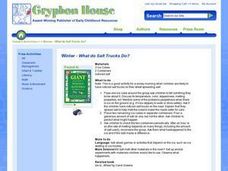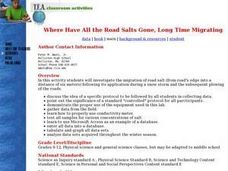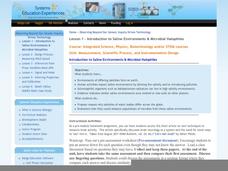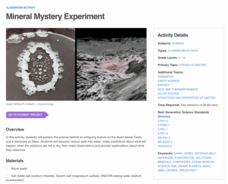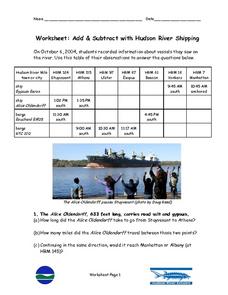Curated OER
Salt, To Use or Not To Use
Fifth graders develop a deeper understanding of chemical and physical changes. They explain how salt is made, used, and the affects it has on the body. They explain that salt in moderation is important to our health.
Curated OER
Exploring Great Salt Lake
Fourth graders go on a field trip to make observations about plants in the Great Salt Lake area. They make observations about the environment and record the types of pants that are living there. The activity is to introduce the concepts...
Curated OER
Great Salt Lake Introductory lesson
Fourth graders explore the Great Salt Lake. Using the internet, they identify web sites that contain information on the Great Salt Lake. After researching the website, 4th graders answer questions and list information they collected...
Curated OER
Tracking the Salt Front
Students manipulate Hudson River salt front data from October 2004 -
September 2005 to locate the high and low points of the salt front for each month, They determine the range for each month, determine the modal range for each month,...
Curated OER
What Do Salt Trucks Do?
Students predict what will happen to ice when salt is put on it. They make observations and discuss what actually happened to the ice. They relate their experiment to the salt trucks they see on the street.
Curated OER
Where Have All the Road Salts Gone, Long Time Migrating
Young scholars examine what happens to road salt after it is applied to the road during a storm. In groups, they collect their samples using a conductivity meter and enter their data into a database. They analyze and discuss the data...
Curated OER
Quiz on pH, Acids, Bases, Alkalis, Neutralisation and Salts
In this chemistry worksheet, students complete 5 multiple choice questions by selecting the correct answer from the drop down box.
Curated OER
Salt, Soil and Seeds
Students investigate seed growth by experimenting with different soils. In this ecology lesson plan, students plant seeds in paper cups and add differing amounts of salt to enhance the growth process. Students record which plants will...
Curated OER
Salt: Up Close and Personal
Students view salt under varied magnifications so students can begin to construct the understanding that materials may be composed of parts that are too small to be seen without magnification.
Institute for Systems Biology
Introduction to Saline Environments & Microbial Halophiles
If you do not mind wading through unrelated headings (This is not for a physics or STEM course, as it states.) and content (The lesson opens with an article about neurology, not halophiles.), then you will find a valuable resource on...
Curated OER
WET Science Lesson #5: Pass the Salt Please! (How Road Salt Affects Wetlands)
As an anticipatory set, biologists listen to the story of Ruth Patrick, a scientist who used algae to detect water quality. They observe a demonstration of osmosis and diffusion. In their lab groups, they place Elodea stalks in...
Curated OER
Tracking the Salt Front
Using the Hudson River as the focus, learners discuss the difference between salt water and fresh water environments, analyze maps and graphs, and complete addition and subtraction problems. This activity comes with a wealth of...
Royal Society of Chemistry
Some Reactions of Carbon Dioxide—Microscale Chemistry
Precipitation reactions are always interesting. How about one that forms a precipitate using a gas? Chemists of any age will enjoy this twist on a standard solubility lab. Partners observe the lack of interaction between sodium hydroxide...
NASA
Mineral Mystery Experiment
One way to study something is to try to replicate it. Young scientists do just that as they use solutions to recreate mineral structures on a dwarf planet. They make solutions with different types of salt, evaporate them, and observe the...
Curated OER
Hydrolysis
In this hydrolysis worksheet, students write dissociation equations for the given salts and determine if the salt is acidic, basic, or neutral. This worksheet has 6 fill in the blank questions and 4 problems to solve.
Curated OER
"Eggs-perimenting" Fun
Students dissolve salt into water, place an egg into a glass of salt water, observe and record observations, make a scientific hypothesis, summarize what they studied from this hands-on experiment. They share their ideas and findings...
Curated OER
What's the Difference Between Concentration and Solubility?
High schoolers discuss the difference between concentration and solubility as well as examine the difference in a hands-on activity. Using water and table salt, they experiment with solubility. They create different concentrations using...
Curated OER
Water Ph
Eighth graders study the concepts of acids, bases, salts and neutralization. They discuss steam adoption program, acid rain and other ecological implications. They use indicators to obtain pH values of household chemicals and to...
Curated OER
Add & Subtract with Hudson River Shipping
In this shipping on the Hudson River worksheet, students record information about types of vessels seen on the Hudson River and respond to the questions that follow about each. Then they identify the Alice Oldendorff which carries road...
Curated OER
Volcanoes
Students make a volcano out of a soda bottle, flower, salt, oil, and more. In this volcanoes lesson plan, students also read about volcanoes.
Curated OER
Advanced Critical Reading: Salt
In this critical reading learning exercise, learners read a passage regarding salt then answer three questions based on the reading.
Curated OER
Salts
In this salts worksheet, students read how salts are created and how different acids make different salts. This worksheet has 1 graphic organizer and 7 short answer questions.
Curated OER
Water Properties of the Great Salt Lake
Fourth graders examine the ecosystem of the Great Salt Lake in this two-part lesson, completing a KWL chart before and after the field trip to the site. While there, they draw and write about their observations. To test for buoyancy,...
Curated OER
Does salt have an effect on the temperature of ice?
Learners explore the effect that salt has on the temperature of ice. In this scientific inquiry instructional activity, students observe an experiment to see how cold ice can get when salt is added. Learners then explore how the ice...
Other popular searches
- Salt Dough Map
- Salt Water
- Salt Marshes
- Salty Oceans
- Gold and Salt Trade
- Great Salt Lake
- Epsom Salt
- Salt Water Chemistry
- Fresh Water Salt Water
- Mahatma Gandhi Salt March
- Growing Salt Crystals
- Freshwater and Saltwater






